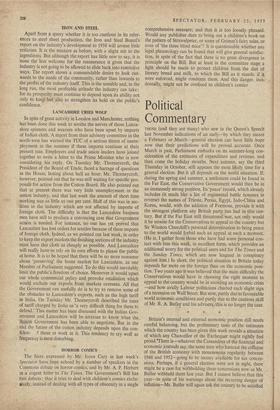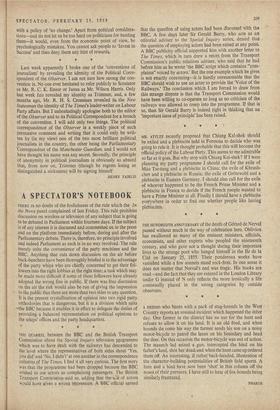Political Commentary
THOSE (and they are many) who saw in the Queen's Speech last November indications of an early—by which they meant a February or March—general election can have little hope now that their predictions will be proved accurate. Once March is past, Parliament embarks on its summer-long con- sideration of the estimates of expenditure and revenue, and then come the holiday months. Next autumn, say the third Thursday in October, still appears the most likely time for a general election. But it all depends on the world situation. If, during the spring and summer, a settlement could be found in the Far East, the Conservative Government would then be in an immensely strong position. Its 'peace' record, which already includes (it reads like a list of regimental battle honours in reverse) the names of Trieste, Persia, Egypt, Indo-China and Korea, would, with the addition of Formosa, provide it with the strongest platform any British party has had in this cen- tury. But if the Far East still threatened war, not only would it be unwise for the Conservatives to appeal to the country, but Sir Winston Churchill's personal determination to bring peace to the world would forbid such an appeal at such a moment. (He is, I gather from those who have had some personal con- tact with him this week, in excellent form, which provides an additional worry for the political seers and for The Times and the Sunday Times, which are now leagued in conspiracy against him.) In short, the political situation in Britain today depends far more on the foreign than on the economic posi- tion. Two years ago it was believed that the main difficulty the Conservatives would have in choosing the right motent to appeal to the country would be in avoiding an economic crisis —and how avidly Labour politicians charted each slight sign of a recession on Wall Street. But now, partly due to favourable world economic conditions and partly due to the cautious skill of Mr. R. A. Butler and his advisers, this is no longer the case.
*1 *.
Britain's internal and external economic position still needs careful balancing, but the preliminary taste of the estimates which the country has been given this week reveals a situation of which any Chancellor of the Exchequer might rightly feel proud.There is—whatever the Cassandras of the financial and economic journals say, the same men who forecast the collapse of the British economy with monotonous regularity between 1946 and 1952—going to be money available for tax conces- sions. Perhaps, if a general election were not in sight, there might be a case for withholding these concessions now as Mr. Butler withheld them last year. But I cannot believe that this year—in spite of his warnings about the recurring danger of inflation—Mr. Butler will again ask the country to be satisfied with a policy of `no change' Apart from political considera- tions—and do not let us be too hard on politicians for heeding them—it would, even from the economic point of view, be psychologically mistaken. You cannot ask people to 'Invest in Success' and then deny them any hint of rewards.
Last week apparently I broke one of the 'conventions of journalism' by revealing the identity of the Political Corre- spondent of the Observer. I am not sure how strong the con- vention is. No one ever hesitated to refer publicly to Scrutator as Mr. R. C. K. Ensor or Janus as Mr. Wilson Harris. Only last week Isis revealed my identity as Trimmer, and, a few months ago, Mr. R. H. S. Crossman revealed in. the New Statesman the identity of The Times's leader-writer on Labour Party affairs. But I unhesitatingly apologise both to the editor of the Observer and to its Political Correspondent for a breach of the convention. I will add only two things. The political correspondence of the Observer is a weekly piece of such persuasive comment and writing that it could only be writ- ten by (in my view) one of the two most brilliant political journalists in the country, the other being the Parliamentary Correspondent of the Manchester Guardian, and I would not have thought his name was any secret. Secondly, the principle of anonymity in political journalism is obviously so absurd that, from now on, Trimmer (though he regrets losing so distinguished a nickname) will be signing himself
HENRY FAIRLIE











































 Previous page
Previous page